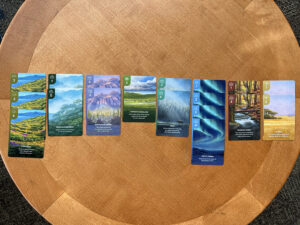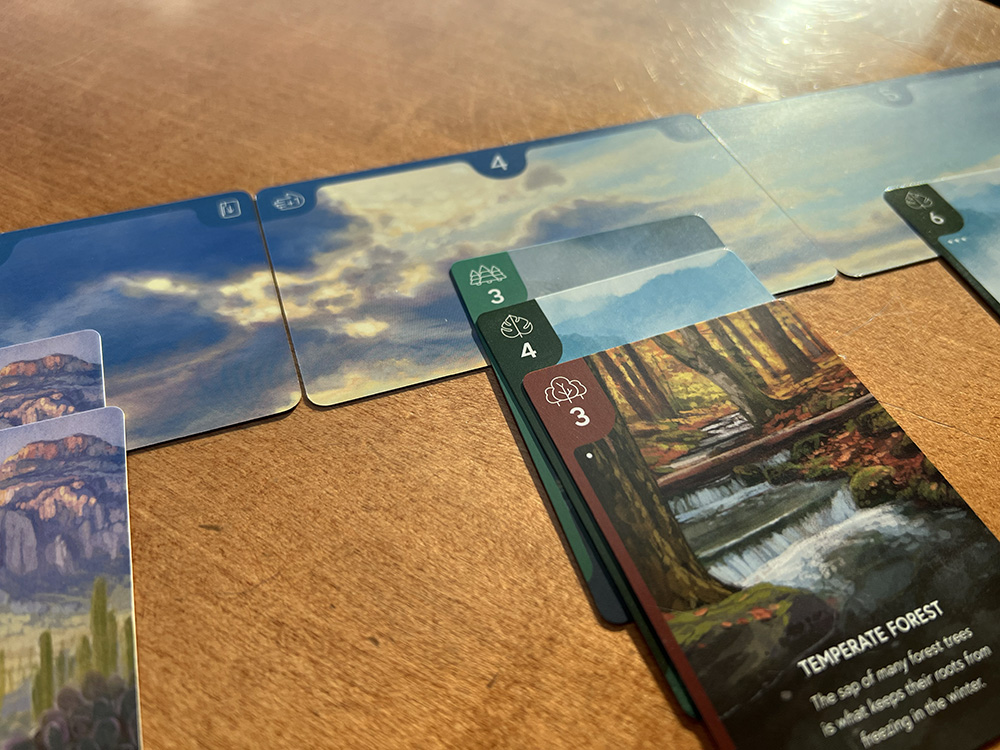 From the savannah to the taiga, the grasslands to the Arctic tundra, natural beauty is all around. Take on the role of a scientific researcher exploring diverse biomes, biologic environments filled with life.
From the savannah to the taiga, the grasslands to the Arctic tundra, natural beauty is all around. Take on the role of a scientific researcher exploring diverse biomes, biologic environments filled with life.
Catalog your exploration of the world through your research notes and arrange them to become the most renowned scientist you can in Subastral, a set collection card game for 2-5 players.
Gameplay Overview:
A line of cloud cards numbered 1-6 defines the play space for Subastral, with the draw deck by the first cloud, and a sun card by the last. The deck is composed of cards representing 8 planetary biome suits, and the suits contain cards numbered 1-6.
Each turn, players place a numbered biome card from their hand onto the corresponding cloud. Depending on where they placed the card, they can either take a stack of cards from another cloud into their hand or take a stack and play them into their scoring tableau.
Players must have cards to play in their hand, but points are awarded at the end to the player who most skillfully built their tableau. Keeping these two choices in balance is the crux of Subastral.

Game Experience:
Knowing that a game is illustrated by an industry titan like Beth Sobel (Wingspan, Cascadia, Calico) sets up astronomically high expectations. The art in Subastral delivers. Each biome is unique and distinct, with scenic portraits that deserve to be framed. It’s a treat to see them all laid out, giving the calming vibe of enjoying the vistas after a satisfying hike. Sobel has an instinctive ability to create art that is individual but complementary, so that while the biomes are visually diverse, they look just as good intermixed. The scientific facts about the different biomes that are printed on each card add nice flavor without being too distracting.

The art theme isn’t particularly well tied into the dynamics of the game, however. It could be a game about different cupcakes or types of dogs and the set collection mechanics would be unaffected. The art is beautiful, and the mechanics present an interesting puzzle, but the two things feel very independent of one another.
The tableau building aspect of this game is a worthy challenge for any fan of set collection games. While the scoring system can be difficult to grok the first time through, once it clicks it is delightfully tricky to execute skillfully. There are two sets of scoring conditions that players are working towards at the same time. Players arrange the cards that they’ve taken horizontally by biome and vertically in order of acquisition. The two largest vertical rows score, earning more points the farther right in the tableau they are. Horizontal rows score based on how many different biomes are in an unbroken row, starting from the left and ending when there is a gap between biomes.
Balancing these two goals with the need to also keep your hand stocked with options leaves space for more tricky choices to be made than one would expect in such a small and light game. We finished playing and immediately wanted to launch into another round, just to see if we could top our scores.

Final Thoughts:
Subastral is compact and well put together set collection game with superb art. While the scoring is a little convoluted, the challenge is rewarding once players come to grips with it. The accuracy of the biome art will appeal to science and nature fans, although it does not have any particular impact on gameplay. In the crowded field of ‘purse sized’ card games, this one stands out for its beauty and replay value.
Final Score: 3.5 Stars – Solidly fun for those who can’t get enough of set collection games.
 Hits:
Hits:
• Top notch art
• Rewarding puzzle with several layers of complexity
Misses:
• Theme is loosely integrated.
• Scoring is convoluted and tricky to learn.





















